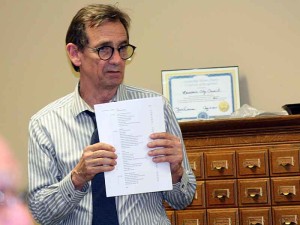City council OKs sending draft 911 agreement to Nelson Fiscal Court
By JIM BROOKS
Nelson County Gazette / WBRT Radio
Tuesday, Jan. 26, 2016, 11:45 p.m. — The Bardstown City Council approved a draft of new interlocal agreement that governs the roles the city and county governments have in the city-county E-911 dispatch center and its board — including recommendations of how to best fund the dispatch center.
Larry Green, the city’s assistant administrator, explained to the council that the city and county both use general fund tax dollars to help cover the dispatch center’s costs not paid for by 911 fees. In effect, Green said, city residents — who are also county residents — each have their taxes used to pay for 911 expenses.
According to Green, this means that city residents pay twice for 911 service — and as a result, they pay twice as much as they should be paying.
Bardstown residents make up 29 percent of the county’s population, but they pay 60 percent of the cost for 911 dispatch, according to Green.
Instead of the county paying 60 percent of expenses and the city paying 40 percent, the double taxation of city residents means the reverse is true — the total taxes collected from city residents pay 60 percent of the dispatch center’s expenses.
Green also mentioned Nelson Fiscal Court’s recent discussions about funding the 911 dispatch center. The county’s landline telephone 911 fee amounts to $20.50 per year. Currently the fee is collected only from landline users via their phone bill. The county now has the option of removing the 911 fee from phone bills and placing it as an annual fee on county property tax bills or utility bills.
The move will increase 911 revenues that have fallen over the years as individuals and businesses drop landlines and move to using to cell phones.
Green said the county’s proposal is a move in the right direction, but if the annual fee isn’t changed, it would still mean the city and county governments would need to help fund the dispatch center — and that city taxpayers would still be left paying twice for 911 services.
Green said he encouraged Nelson Fiscal Court to move forward with plans to put the 911 dispatch fee on property tax bills. He also suggested the county raise the annual fee from $20.50 to $40.44. If placed on property tax bills, the higher fee will raise sufficient revenue to fund the dispatch center’s operation without the use of any tax dollars from the city or county governments.
Changing the funding mechanism creates an opportunity to fully fund the dispatch service with revenues it needs without taking general fund money from city or county government, he told the council.
“That seems to be the fairest way to do it,” he said. “There’s no double paying by people in the city, and its enough to fund the 911 dispatch center.”
The city and county both agree the dispatch center needs to be adequately funded, Green said. “The only question is where the money comes from.”
The city’s proposed interlocal agreement doesn’t specify the funding mechanism, only that the dispatch board would be funded solely by 911 fees.
DISPATCH BOARD MAKE-UP. Green told the council that the proposed agreement would give the city and county control of making appointments to the dispatch board — something the existing agreement does not specify.
The mayor of Bardstown and the county judge-executive would each appoint three members; two of each government’s representatives would need to come from law enforcement.
The dispatch board would approve the hiring of the director, who would then be responsible for the day-to-day operation of the dispatch center.
DISPATCH BOARD BUDGET. The dispatch board’s budget would still need to be approved by the city and county governments. If a budget cannot be agreed upon, the new agreement would have just the mayor and judge executive meet to create a budget that would be binding on the dispatch board.
POLICIES & PROCEDURES. This are established by the dispatch board. The change would continue to require board approval, but it would also require approval by city and county governments.
Following its unanimous approval by the council, the measure goes next to Nelson Fiscal Court for its consideration.
-30-







